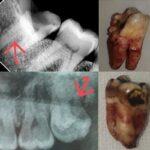Dental Implants
- What are dental implants?
Dental implants are a type of artificial tooth roots that provide a permanent base for fixed or removable replacement teeth. They are typically made of titanium and other biocompatible materials that are surgically placed into the jawbone. Over time, the bone and tissue around the implant fuse to the implant, creating a strong and stable foundation for the replacement tooth.
Dental implants can be used to replace one or multiple missing teeth, and they are considered a long-lasting solution for tooth loss. They can also help to preserve jawbone density and prevent the facial structure from changing due to missing teeth. Additionally, dental implants can improve a person’s biting and chewing function, and they can provide a natural appearance that is similar to real teeth.
- When are dental implants prescribed?
Dental implants are typically prescribed to people who are missing one or more teeth due to injury, disease, or other reasons. Some common situations in which dental implants may be recommended include:
- Single missing tooth: A dental implant can be used to replace a single missing tooth, preserving the health and appearance of the surrounding teeth.
- Multiple missing teeth: Implants can be used to support a bridge or denture when multiple teeth are missing.
- Unstable dentures: Dental implants can be used to anchor a denture, providing stability and improving chewing function.
- Facial trauma: In cases of facial trauma, dental implants can be used to replace broken or missing teeth.
- Decay or gum disease: When decay or gum disease results in the loss of one or more teeth, dental implants can be used as a replacement option.
It’s important to note that not everyone is a candidate for dental implants. Your dentist or oral surgeon will evaluate your overall health and the health of your jawbone to determine if dental implants are a good option for you. They may also take X-rays, CT scans, and other diagnostic tests to assess your suitability for the procedure.
- What is procedure for dental implants?
The procedure for dental implants typically involves several stages and can take several months to complete. Here is a general overview of the steps involved in the dental implant process:
- Consultation and planning: Your dentist or oral surgeon will evaluate your overall health and the health of your jawbone to determine if dental implants are a good option for you. They may also take X-rays, CT scans, and other diagnostic tests to assess your suitability for the procedure.
- Preparation: If you are a candidate for dental implants, your dentist will numb the area and make an incision in your gum to expose the jawbone. They will then drill a small hole into the bone to make room for the implant.
- Implant placement: The implant, which is typically made of titanium, is then placed into the hole in the jawbone. In some cases, a temporary dental restoration may be placed over the implant while it heals.
- Healing and osseointegration: After the implant is placed, the jawbone will begin to heal and grow around the implant, a process called osseointegration. This process can take several months and is essential for the long-term success of the implant.
- Implant abutment placement: Once the implant has fully integrated with the jawbone, the dentist will place an abutment, which is a small metal post that sticks out of the gum.
- Final restoration:Finally, a crown, bridge, or denture will be attached to the abutment to complete the restoration. The final restoration will be custom-made to match the color and shape of your surrounding teeth, providing a natural-looking and functional replacement for your missing tooth or teeth.
It’s important to keep in mind that every patient’s situation is unique, and the exact procedure for dental implants may vary depending on factors such as the number of implants being placed, the condition of the jawbone, and other individual factors.
- What are different typesof dental implants?
There are several different types of dental implants, each with its own unique features and benefits. Some of the most common types of dental implants include:
- Endosteal Implants: Endosteal implants are the most common type of dental implant and are surgically placed directly into the jawbone. They are typically shaped like screws, cylinders, or blades and can be used to support individual crowns or multiple teeth with a bridge or denture.
- Subperiosteal Implants:Subperiosteal implants are placed on top of the jawbone, rather than within it. They are typically used for patients with a shallow jawbone that may not be able to support endosteal implants.
- Mini Dental Implants: Mini dental implants are smaller in diameter than traditional endosteal implants and are often used to support dentures or stabilize loose teeth. They are typically less invasive and less expensive than other types of implants.
- Zygomatic Implants:Zygomatic implants are longer and thicker than traditional endosteal implants and are used to support replacement teeth in cases of severe bone loss in the upper jaw.
- All-on-4 Dental Implants: All-on-4 is a brand name for a specific type of implant-supported denture that utilizes just four implants to support an entire arch of replacement teeth. This type of implant is often used for patients who have lost all of their teeth in an arch and have insufficient jawbone to support traditional endosteal implants.
The type of dental implant that is right for you will depend on a variety of factors, including the amount of jawbone available, the location and number of missing teeth, your overall health, and your specific treatment goals. Your dentist or oral surgeon can help you determine which type of dental implant is best for your situation.
- How much time does it take for dental implants procedure?
The length of time it takes to complete the dental implant procedure can vary depending on several factors, including the number of implants being placed, the condition of the jawbone, and the type of restoration being used. In general, the dental implant process can take several months to complete and involves several stages, including consultation and planning, preparation, implant placement, healing and osseointegration, abutment placement, and final restoration.
Typically, the initial consultation and planning phase can take one or two visits to the dentist. The preparation and implant placement stage usually takes one to two hours per implant and is performed under local anesthesia or conscious sedation.
The healing and osseointegration phase can take several months, during which time the jawbone will grow around the implant to anchor it securely in place. Once the implant has fully integrated with the jawbone, the dentist will place the abutment and final restoration, which can take one to two additional visits.
It’s important to keep in mind that every patient’s situation is unique, and the exact length of time it takes to complete the dental implant process will vary depending on individual factors such as the complexity of the case and the patient’s healing process. Your dentist or oral surgeon can provide a more accurate timeline for your specific situation.
- Pros and cons of dental implants
Dental implants are a popular and effective solution for replacing missing teeth, but like any medical procedure, they have both benefits and drawbacks. Here are some of the pros and cons of dental implants:
Pros:
- Improved appearance: Dental implants can improve the appearance of your smile by replacing missing teeth and restoring the natural look and function of your mouth.
- Improved oral health: Dental implants do not require reduction of adjacent teeth, as is necessary with a bridge, and therefore help to preserve the healthy natural teeth.
- Improved comfort: Dental implants are designed to fuse with the jawbone, creating a stable base for replacement teeth. This can provide a more comfortable fit than traditional dentures or bridges.
- Durability: Dental implants are made of biocompatible materials, such as titanium, that can last for many years with proper care.
- Improved speech: Missing teeth can affect speech, but dental implants can restore the natural function of the mouth, allowing for improved speech.
Cons:
- Cost: Dental implants are often more expensive than other tooth replacement options, such as bridges or dentures.
- Surgery: Dental implant placement involves a surgical procedure, which can be a concern for some patients.
- Healing time: The dental implant process can take several months to complete, and patients may need to avoid certain foods during the healing period.
- Maintenance: Dental implants require regular cleaning and maintenance, just like natural teeth, to ensure their longevity and prevent complications.
- Risk of infection: As with any surgical procedure, there is a small risk of infection associated with dental implant placement.
It’s important to carefully consider the pros and cons of dental implants and discuss your options with your dentist or oral surgeon to determine if dental implants are the right choice for you. They can help you weigh the benefits and drawbacks and develop a personalized treatment plan that meets your individual needs and goals.
- Are dental implants expensive?
Yes, dental implants can be more expensive compared to other tooth replacement options, such as bridges or dentures. The cost of dental implants can vary widely depending on several factors, including the number of implants needed, the type of implant used, the location of the dental practice, and the experience and qualifications of the dentist or oral surgeon.
On average, the cost of a single dental implant can range from $1,500 to $3,000 or more in the United States. The cost of a full-arch reconstruction using implants can be significantly higher, ranging from $20,000 to $50,000 or more.
It’s important to keep in mind that dental implants are considered a long-term investment in your oral health, and they can last for many years with proper care. They can also provide a more stable, comfortable, and natural-looking solution for missing teeth compared to traditional bridges or dentures.
- How long does the dental implants last?
With proper care and maintenance, dental implants can last for many years, even a lifetime. The longevity of dental implants depends on several factors, including the quality of the implants, the skill of the dentist or oral surgeon, and the patient’s oral hygiene habits.
In general, dental implants are made of biocompatible materials, such as titanium, that are highly durable and resistant to wear and tear. The success rate of dental implants is estimated to be over 95% after 10 years, and many implants can last for 20 years or more with proper care.
To ensure the longevity of your dental implants, it’s important to maintain good oral hygiene habits, such as brushing and flossing regularly, and visiting your dentist for routine check-ups and cleanings. It’s also important to avoid habits that can put excessive stress on your implants, such as chewing on hard objects or grinding your teeth.
It’s important to keep in mind that, like natural teeth, dental implants can be subject to damage or failure in rare cases. Regular dental exams and cleanings can help detect any potential issues early and prevent complications, such as infection, bone loss, or implant failure.
Overall, dental implants can provide a long-lasting solution for missing teeth, and with proper care, they can help to restore your smile and improve your oral health for many years to come.
- Are dental implants safe?
Dental implants are generally considered safe, and the procedure has a high success rate. Like any medical procedure, dental implant placement carries some risk, but these risks are typically minor and can be effectively managed with proper planning and care.
Some of the potential risks associated with dental implants include:
- Infection: The surgical site can become infected, but this risk can be reduced by practicing good oral hygiene and following your dentist’s or oral surgeon’s post-operative instructions.
- Implant failure: In rare cases, the implant may fail to integrate with the jawbone or the crown may come loose, but this risk can be reduced by selecting a qualified and experienced dentist or oral surgeon and using high-quality implants.
- Nerve damage: The procedure may cause temporary or permanent nerve damage, but this risk can be minimized by carefully planning the placement of the implants and avoiding excessive pressure during the placement procedure.
- Sinus problems: In some cases, dental implants placed in the upper jaw can affect the sinuses, but this risk can be reduced by carefully planning the placement of the implants and ensuring that adequate bone height is available.
- Rejection: In rare cases, the body may reject the implant, but this risk can be reduced by using biocompatible materials, such as titanium, and carefully screening patients for any medical conditions that may affect the success of the procedure.
It’s important to carefully consider the risks and benefits of dental implants and discuss your options with your dentist or oral surgeon to determine if dental implants are the right choice for you. They can help you understand the risks associated with your specific treatment plan and develop a personalized plan for your care.
Overall, dental implants are a safe and effective solution for missing teeth, and with proper planning and care, they can help to restore your smile and improve your oral health.













